- Home
- Elmore Leonard
Stick
Stick Read online
ELMORE LEONARD
Stick
For Joan, always
Contents
The Extras
Chapters:
Chapter 1
Chapter 2
Chapter 3
Chapter 4
Chapter 5
Chapter 6
Chapter 7
Chapter 8
Chapter 9
Chapter 10
Chapter 11
Chapter 12
Chapter 13
Chapter 14
Chapter 15
Chapter 16
Chapter 17
Chapter 18
Chapter 19
Chapter 20
Chapter 21
Chapter 22
Chapter 23
Chapter 24
Chapter 25
Chapter 26
Chapter 27
About the Author
Praise and Acclaim
Books by Elmore Leonard
Copyright
About the Publisher
1
STICK SAID HE WASN’T GOING if they had to pick up anything. Rainy said no, there wasn’t any product in the deal; all they had to do was drop a bag. Stick said, “And the guy’s giving you five grand?”
“It makes him feel important,” Rainy said, “it’s how it’s done. Listen, this’s the big time, man, I’m taking you uptown.”
Rainy told Stick he didn’t even have to say a word unless the guy Chucky asked him something. Which he probably would, Chucky liked to talk. He was a you-all, he talked real nice and easy, real slooow, slower than you, Rainy said. Stick said he could hardly wait to meet the guy, thinking: Rainy and Chucky . . . like they were hanging around the playground.
You go out to Hialeah, Calder, Rainy said, everybody out there, the cocktail waitresses, everybody, they call him just Chucky. But you go down on Southwest Eighth Street, around in there, or some places down in South Miami where they used to know him on the street, anybody down there they still call him Chucky Buck, Rainy said. It was like his street name before he moved up to his top floor condominium. Yeah, Chucky Buck. Now, he went to his country club, any place like that, he used his real name again, Chucky Gorman. He was about forty but tried to act young. Big guy. Not real fat, but he had a weird shape for a guy, like a woman. Maybe he was even kind of a weird person, some people thought he was a switch-hitter. But a nice guy. You could jive with him, say anything you want, Chucky never got bummed or nothing.
Rainy’s real name was Rene Moya: light-skinned Puerto Rican and something like one-eighth Haitian from his mother’s side. He drove van loads of marijuana from Miami up the Interstate to Toledo and Detroit. He weighed a hundred and thirty and wore a neat little waiter mustache.
Stick’s name was Ernest Stickley, Jr. He was forty-two years old, born in Norman, Oklahoma, but raised in Detroit where his dad had come to work at Ford Rouge. Stick looked like he was from another time: dustbowl farmer turned hobo. He was at a low point in his life.
He and Rainy had met in Jackson, Michigan, when both of them were staying at 4000 Cooper Street, gateway to the world’s largest walled prison: Stick doing seven to twenty for armed robbery; Rainy three to four, possession with intent to deliver, after they told him, “You walk you talk,” which meant probation, and he turned them down, hung in and did the full three. Rainy got out a few months before Stick’s release date. He told Stick to come down to Miami and get some sunshine, some fresh air, man, meet some chicks. Stick said he was going down there anyway to see his little girl; he hadn’t seen her since she was seven.
What they were doing now was not recreation; it was to make a buck.
Stick kept looking at the girl-bartender because she was so fresh and clean looking she could be in an orange juice or a suntan lotion ad. She had a glow to her, perfect tan, perfect white teeth, a tall girl with nice easy moves, natural. She wore a little nameplate that said her name was Bobbi.
They had come up from Miami to Lauderdale in Rainy’s new van to meet this guy Chucky and run the errand for him.
The place they were in was called Wolfgang’s, a marina bar on the Intracoastal at Sunrise. Outside, every half hour a bell would start dinging and the bridge would go up to let a few cruisers and sailboats go by. Inside, then, somebody down at the end of the bar would blow what sounded like a foghorn, a baritone moan and everybody, all the late afternoon fun-seekers, would break up. There was a terrace outside with an awning where you could sit and drink and watch the boats go by. Otherwise, it was like a lot of bars with rose-tinted mirrors and high-gloss wood-grained plastic. A Happy Hour bar.
Everybody was sure working at it.
Didn’t these people have any problems?
Even Rainy Moya seemed happy, feeling the beat and giving the oval edge of the bar funky little finger slaps like it was a fifty-foot bongo. Stick thought it was disco, the music coming out of turned-up speakers somewhere. He mentioned the word disco and the guy on the bar stool to his right—maybe the only guy in the place older than Stick, a hairy bald-headed guy wearing mirror sunglasses and a nautical blue-with-white-piping beach outfit—said disco was out, nobody discoed no more. Stick didn’t like the guy looking at him, hanging on everything he said to Rainy. He asked what people did now if they didn’t disco and Rainy said they fucked. Rainy said man, you been away too long, you got to get caught up with the scene. The music still sounded like disco. Latin disco. Rainy said no, man, it’s fusion, it’s rock, it’s a lot of beats. Where you been?
Stick thought he had kept up. Eleven Block, for honor inmates in maximum security, had its own lounge area on the floor of the cellblock with a color TV. But maybe he had missed a few important events and passings. Nobody had told him when Warren Oates died last spring. He had heard about Belushi but not Warren Oates. He subscribed to magazines . . . He did a hundred push-ups and sit-ups a day the first year and toward the end of the seventh year . . .
Rainy and the tourist in the beach outfit were talking past Stick, vouching for each other, the guy saying everything was different now and Rainy saying that’s right. The guy saying especially the broads. Rainy saying that’s right, nudging Stick and saying listen to him. The guy saying he was married twice but not now, all the stuff around, a guy would have to be out of his mind to get married. Stick glancing at the guy—thinking no way, never, not this guy—and seeing two of himself, his face distorted, sickly, in the guy’s mirror sunglasses; he looked a little better in the tinted glass behind the bar, but the girl-bartender, Bobbi, giving all the loudmouths a nice natural smile, meaning it, not putting it on, made him feel old. Why was she happy, working in this place, watching people get smashed? . . . Rainy was saying that’s right, man, you don’t have to waste no time buying drinks you don’t want to; you see a chick you ask her she want to do it, man; she don’t, okay, no problem, man, you go ask the next one.
Stick left his bourbon and went to the men’s room. He was tired of hearing guys talk, guys wanting you to believe they were street, guys saying man all the time. He shouldn’t have called Rainy. Well, maybe call him and have a drink, but he shouldn’t have promised him anything. Stick washed his hands with the fragrant pink soap that came out of the dispenser, washed them good and stared into the clear mirror at his features. Pale, solemn. Who was that? Like looking at someone else. Back in another life before Jackson he could narrow his eyes at his reflection—hard-boned but not bad looking—and say, “That’s it, huh? That’s all you got?” Then grin and catch a gleam in there and know that if common sense, intelligence, caution, all the straightarrow stuff ever failed him there was always bullshit to fall back on, live by your wits and a tight sphincter. But there was no gleam today. White skin, white shirt, he looked like he just got off the bus with a cardboard suitcase. He ca
me back from the men’s room and nothing had changed.
Sliding up on the bar stool, he said to Rainy, “Is he coming or not?”
Rainy looked at the clock face in a miniature ship’s wheel behind the bar. Five-forty. Rainy said, “He don’t get here by six, man, we go to his place. It’s right there, across the bridge.” He nodded toward the sunlight out on the terrace—across the waterway that was like a wide canal—to the dock and sloping lawn of a condominium.
The tourist turned to look as Stick did, giving Stick the back of his mangy head, bare on top, sunburnt, oily strands of hair hanging over his terrycloth collar. Stick heard Rainy say, “Bobbi? . . . Hey, Bobbi . . .” and now Stick caught a glimpse of his two faces in the mirror sunglasses as the tourist turned this way again, the tourist keeping his nose right in there. The tourist saw Rainy trying to get the good-looking girl-bartender’s attention and called louder than Rainy did, “Hey, Bobbi!” She looked up, capping a strainer over a martini shaker, pouring, raising the shaker up and down, twisting off that last drop. “Get your ass down here,” the tourist said. “We need you.” He said to Stick, “I wouldn’t mind some of that. How about you?”
Stick looked at the guy hunched over the bar, hairy arms, big hand wrapped around a gin and tonic. Stick said, “You got short eyes? That your problem?”
The guy’s forehead creased. “What?”
Stick turned away. The girl was coming over to Rainy now. She looked like Cybill Shepherd, tall, that type, but younger. She was about the healthiest-looking girl Stick had ever seen. Outdoor-looking in a pink knit shirt with a little alligator on it, one of those polo or golf shirts—but not like the other girl-bartender who wore hers tight with her breasts sticking straight out, encased—no, Bobbi wore hers loose with a natural sexiness in the way it hung and the way it strained against her when she made certain moves. She seemed almost too young to be working in here.
Stick’s daughter was fourteen. He hadn’t seen her yet. He’d called, spoken briefly to his ex-wife . . .
Rainy was saying to the girl, “Chucky been in?”
She shook her head. “Haven’t seen him.” She said, “No, so far it’s been a perfect day.”
“I wasn’t sure he stuck his head in and we might have missed him,” Rainy said.
She said, “Are you serious? How could you miss Chucky?”
Stick liked her tone, the easy confidence. He’d bet she was aware and didn’t miss much. She said, “You guys want another one?” looking from Rainy this way, directly at him now. Stick shook his head. Her eyes lingered a moment and he felt a lift and wanted to say something to her.
The tourist said, “You can do me. Fact I’d let you do just about anything you want to me.”
She said, “Big deal.”
The tourist said, “Honey, it might be the biggest deal you ever saw. If you get my meaning.” He reached over to pat her hand, resting on the bar.
She raised her eyebrows and began to say something as Stick said to the tourist, “Keep your hands off her.”
The tourist looked over. “What?”
Bobbi said, “The way it goes, don’t touch what you can’t afford.”
Rainy was off his stool. He came around with his hand moving across Stick’s back. He said, close to him, “Hey, come on, man, let’s take it easy.”
Stick said, “Short eyes . . . Look at him.”
The guy said, “The hell’s he talking about?”
Rainy, still close to Stick, said, “For who, man? We’re in a bar.”
“Look at him,” Stick said.
“All right, it’s all right, man, we got to leave anyway. It’s time to go.” Rainy kept his hands on Stick’s shoulders, turning him away from the tourist, getting him down from the stool.
The tourist took off his sunglasses, squinting, sitting up straight. “What’d he just say?”
“It’s okay, we got to go,” Rainy said and looked at Bobbi, who hadn’t moved. “Lemme have the check. No, we’ll be back. I’ll take care of it later. Okay?”
Stick heard the guy say, “Jesus Christ, some kind of weirdo . . .” but didn’t look at him or at the girl. He was strung up and had to get out of here.
They left the van in the parking lot and walked across the bridge with the traffic moving toward the ocean, tires humming on the metal grid. Stick breathed in and out. He could feel the sun on his back and could feel the Atlantic Ocean two blocks away, beyond the mile-long public beach with its blue cabanas stacked up for the day. He began to come down.
“Man, I see your face,” Rainy said, “I know I got to get you out of there.”
Stick said, “You hear him, what he said?”
“What did he say? He’s jiving her a little. He has some drinks and goes back to the Holiday Inn. Has to sit there and look at his old lady.”
“He told you he wasn’t married. Didn’t you hear him?”
“Hey, listen to you. What difference does it make? He’s got an old lady or he don’t, nobody cares.” Rainy reached up, laid his hand on Stick’s shoulder. “Man, you were the one taught me how to be cool, you remember? Showed me how to make it, not take everything personal, you remember that? Serious things, yeah, you go all the way, but not bullshit things. It’s the same out here, man. You got to tell the difference, right? You didn’t have to prove nothing. What was that in there—little bullshit play with the girl Bobbi? She don’t care. She gets that shit all the time.”
Stick didn’t say anything.
“You’re out with the civilians now,” Rainy said, “you dig? It’s a free country out here, man.” He poked Stick’s shoulder and let his hand drop. “Buy some new clothes and get laid a few times you feel better.”
They moved into the shade of a fifteen-story condominium and started up the drive. A Cadillac stood by the entrance; two guys in suits, sportshirt collars sticking out, were talking to the doorman, looking this way now.
“They work for him,” Rainy said.
The two guys were watching them come up the blacktop grade, both with hands in their pants pockets, giving them dull stares. Stick could see them standing in a cell-block yard in work clothes, down jackets. You could wear anything you wanted at Jackson—if you could keep it and not have to give it to some colored guy with a knit cap down on his eyes. Walk in cherry they would try to take your clothes first, if your clothes had any style, then get around to trying for your body. Most of the cons there were black. Still, you saw the tough white guys with the solid bodies and dark hair. That type, they all had the thick dark hair and stood like they were daring you to move them out of the way. The difference here, Stick realized now, these dark-haired guys were probably Cuban. They were serious mean looking, but not as big as the dark-haired guys he was used to.
“You know them?”
“Maybe,” Rainy said. “I’m not sure. He’s got plenty of people hang around him.”
“What’s he scared of?”
“Are you kidding me?” Rainy said.
2
IF HE HAD TO MAKE a decision over the phone as opposed to just shooting the shit, Chucky liked to take the call in his den where he had a conference speaker system on his eight-foot desk and, over by the door to the living room, a hat-tree loaded with different kinds of hats and caps. He’d put one of them on—the salty yachting cap or the big straw cowboy hat, the hardhat if somebody was trying to give him a hard time, the long-peak fisherman’s cap if he was being philosophical—and move around while he carried on the phone conversation.
When he was moving, Chucky believed, it was like he felt his mind and body on “high” and fully alert, his neurons flashing, making the right connections. It went back to when he was hyperkinetic as a little kid: ten, eleven years old, Christ, he went through something like four dogs, ran the ass off them; they’d come dragging into the house, their tongues hanging out, gasping. He said when he got to running full out even hounds’d throw it in, fuck it, look up at him with those sad eyes.
Chucky said he mel
lowed out quite a bit since he’d grown up, found a plateau he could live on in peace. The steps: flunked out of Wake Forest prelaw. Reached an incredible screaming high in Nam, seven months in-country to a time, two hundred days compressed to a time he couldn’t move to save his mind, had no way to release the panic short of killing himself and tried to, tried like hell . . . and was brought down with Thorazine at the VA hospital in Memphis. The final step, Miami, where Charles Lindsay Gorman III passed through his Chucky Buck phase, hustled, got rich and found happiness on a maintenance dosage of Valium and ‘ludes: before meals or whenever his motor got stuck on high idle.
The effect of his medication was like swimming under water, only without any water. Floating in lights. He still moved, felt the urge, but he wasn’t moving kinetically now, he was floating. He’d load up and let the mood move him along. Cock the straw boater on the side of his head and do a soft shoe on the parquet floor of the den, shuffle stiff-legged to this draggy Kool-and-the-Gang beat he’d turn on softly in his head. Just float, experiencing hundreds of thousands of colored lights popping inside his head like trip flares, only without a sound. See, Chucky said, your hearing gets so acute you have to soundproof your head, turn the decibels way down.
For some reason he had found himself explaining this phenom to the young guy working for the Cubans, Eddie Moke—the person he was talking to right now on the phone—and Moke had said, “That’s what you do, uh, float? I think you got brain damage, man. I think you ought to check it out.” With that frozen sound Moke had, barely moving his mouth. The boy was a study, trying hard to effect the grungy look of a heavy-metal rock star, the headband, the illustrated disco shirt open all the way . . .
He should never have told Moke about floating and doing the soft shoe. The only reason he had was because of the way Moke sat on his spine, giving himself curvature, practically lying in whatever chair he was in, and Chucky had asked him how he could stay like that without ever moving, like he mainlined cement. You would say things to Moke and he wouldn’t respond unless he had to and then would barely move his mouth. And Chucky would take another swing at it, yes, just like trying to bust cement. The Latins dressed up and posed and gave you snappy TV lines—”What’s happening, man?”—but this Moke, he’d lock his jaw like a stoned rocker and give you dreamy slit eyes. Hardest thing in the world, trying to talk to him on the phone . . .

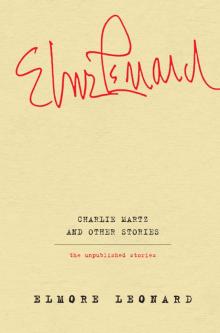 Charlie Martz and Other Stories: The Unpublished Stories
Charlie Martz and Other Stories: The Unpublished Stories Elmore Leonard's Western Roundup #2
Elmore Leonard's Western Roundup #2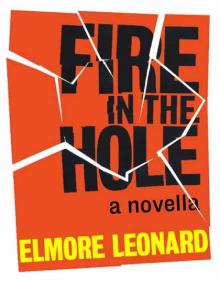 Fire in the Hole
Fire in the Hole Tishomingo Blues (2002)
Tishomingo Blues (2002)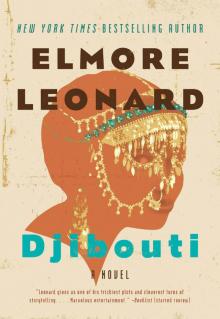 Djibouti
Djibouti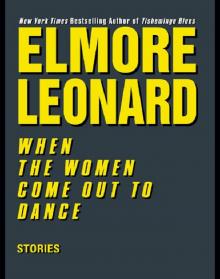 When the Women Come Out to Dance: Stories
When the Women Come Out to Dance: Stories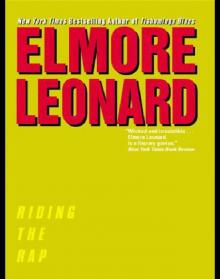 Riding the Rap
Riding the Rap Moment of Vengeance and Other Stories
Moment of Vengeance and Other Stories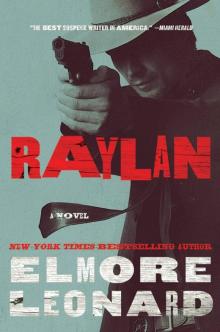 Raylan
Raylan Touch
Touch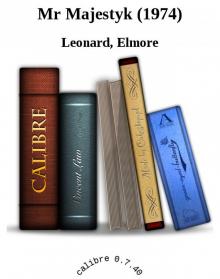 Mr Majestyk
Mr Majestyk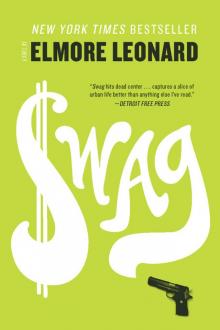 Swag
Swag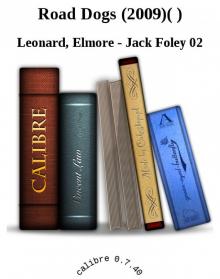 Road Dogs
Road Dogs La Brava
La Brava The Hot Kid
The Hot Kid Valdez Is Coming: A Novel
Valdez Is Coming: A Novel Be Cool
Be Cool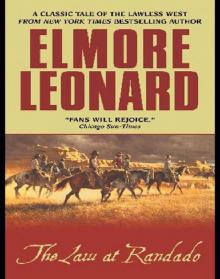 The Law at Randado
The Law at Randado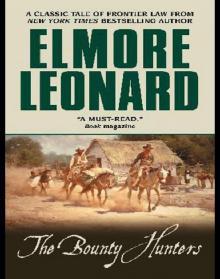 The Bounty Hunters
The Bounty Hunters When the Women Come Out to Dance
When the Women Come Out to Dance 310 to Yuma and Other Stories (1953)
310 to Yuma and Other Stories (1953)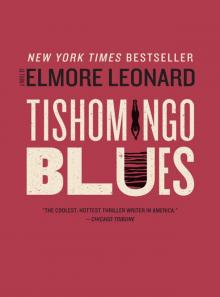 Tishomingo Blues
Tishomingo Blues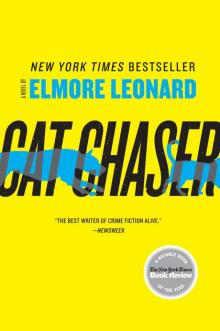 Cat Chaser
Cat Chaser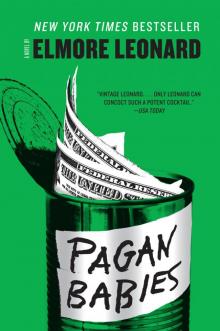 Pagan Babies
Pagan Babies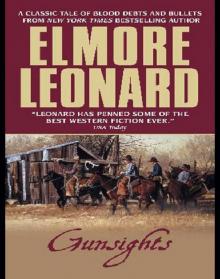 Elmore Leonard's Western Roundup #1
Elmore Leonard's Western Roundup #1 52 Pickup
52 Pickup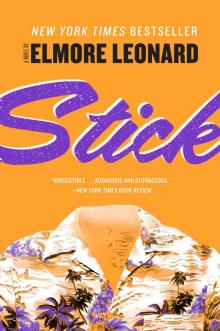 Stick
Stick The Moonshine War
The Moonshine War Valdez Is Coming
Valdez Is Coming City Primeval
City Primeval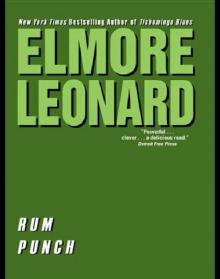 Rum Punch
Rum Punch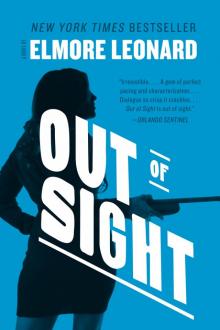 Out of Sight
Out of Sight Naked Came the Manatee (1996)
Naked Came the Manatee (1996)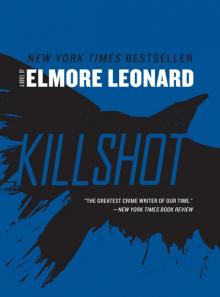 Killshot
Killshot Cuba Libre
Cuba Libre Forty Lashes Less One
Forty Lashes Less One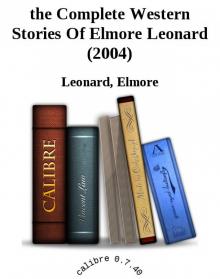 The Complete Western Stories of Elmore Leonard
The Complete Western Stories of Elmore Leonard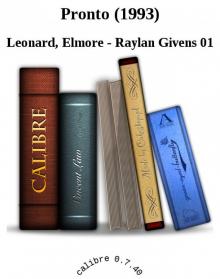 Pronto
Pronto Split Images
Split Images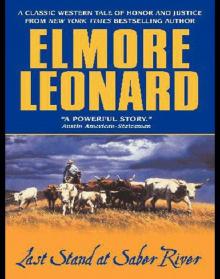 Last Stand at Saber River
Last Stand at Saber River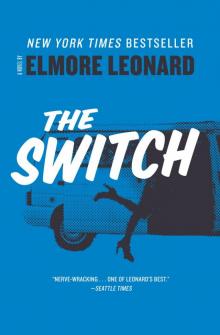 The Switch
The Switch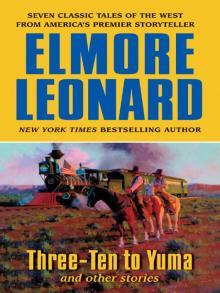 Three-Ten to Yuma and Other Stories
Three-Ten to Yuma and Other Stories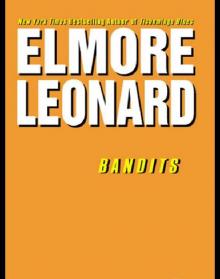 Bandits
Bandits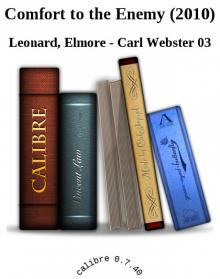 Comfort to the Enemy and Other Carl Webster Stories
Comfort to the Enemy and Other Carl Webster Stories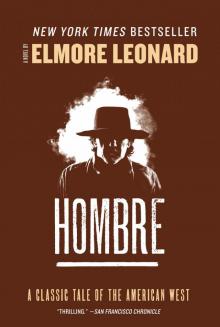 Hombre
Hombre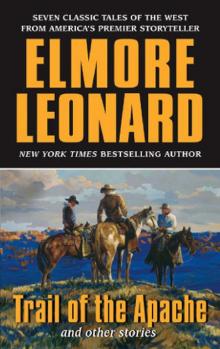 Trail of the Apache and Other Stories
Trail of the Apache and Other Stories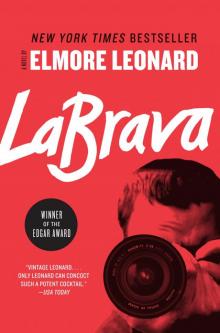 LaBrava
LaBrava Gold Coast
Gold Coast Jackie Brown
Jackie Brown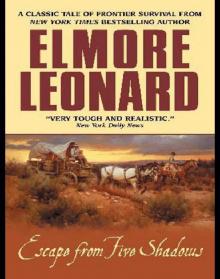 Escape From Five Shadows
Escape From Five Shadows Karen Makes out (1996)
Karen Makes out (1996)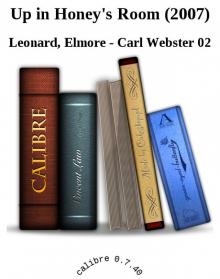 Up in Honey's Room
Up in Honey's Room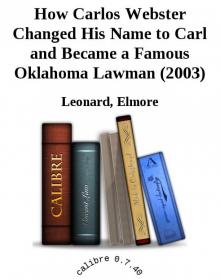 How Carlos Webster Changed His Name to Carl and Became a Famous Oklahoma Lawman (2003)
How Carlos Webster Changed His Name to Carl and Became a Famous Oklahoma Lawman (2003)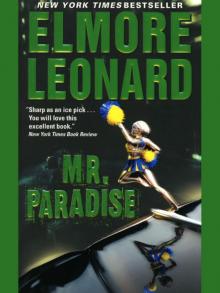 Mr. Paradise
Mr. Paradise The Hunted
The Hunted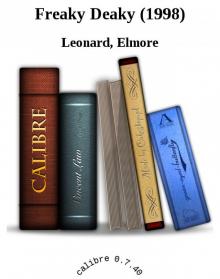 Freaky Deaky
Freaky Deaky Louly and Pretty Boy (Ss)
Louly and Pretty Boy (Ss)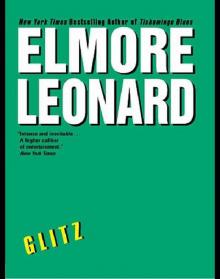 Glitz
Glitz A Coyote's in the House
A Coyote's in the House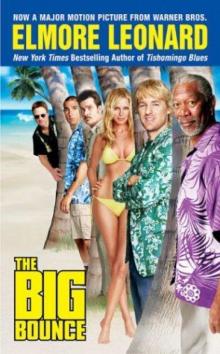 The Big Bounce jr-1
The Big Bounce jr-1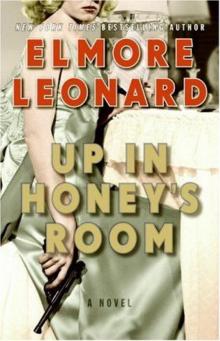 Up in Honey's Room cw-2
Up in Honey's Room cw-2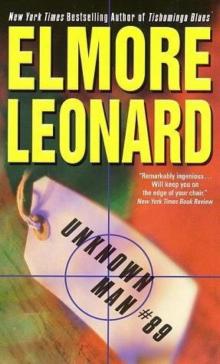 Unknown Man #89 jr-3
Unknown Man #89 jr-3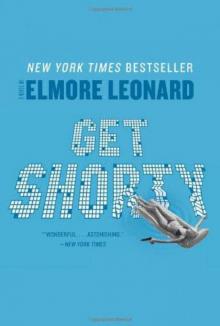 Get Shorty: A Novel cp-1
Get Shorty: A Novel cp-1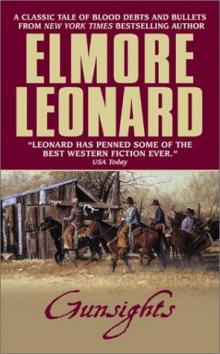 Gunsights
Gunsights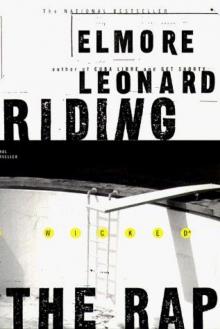 Riding the Rap rg-2
Riding the Rap rg-2